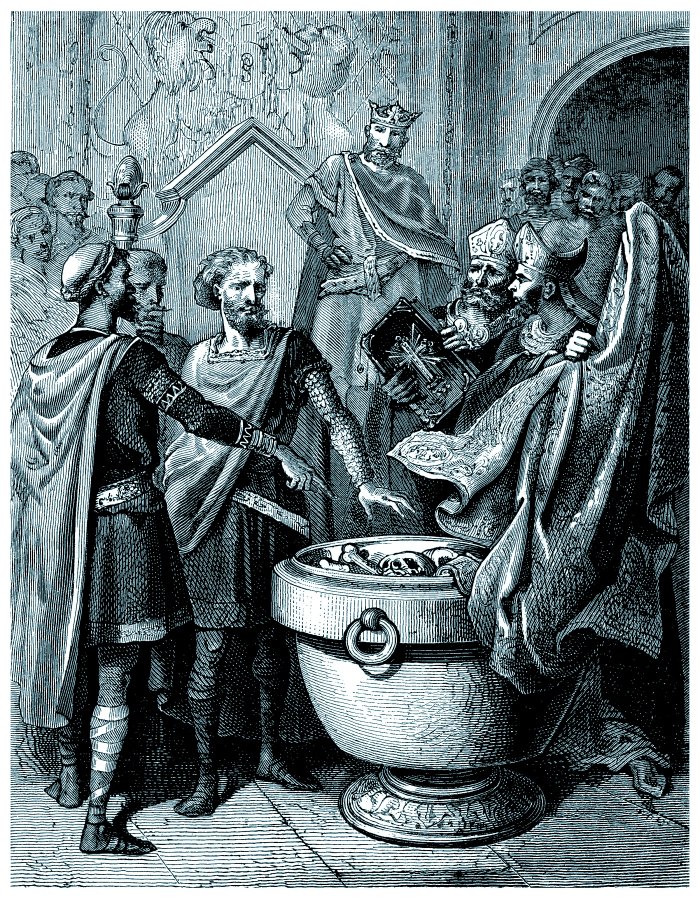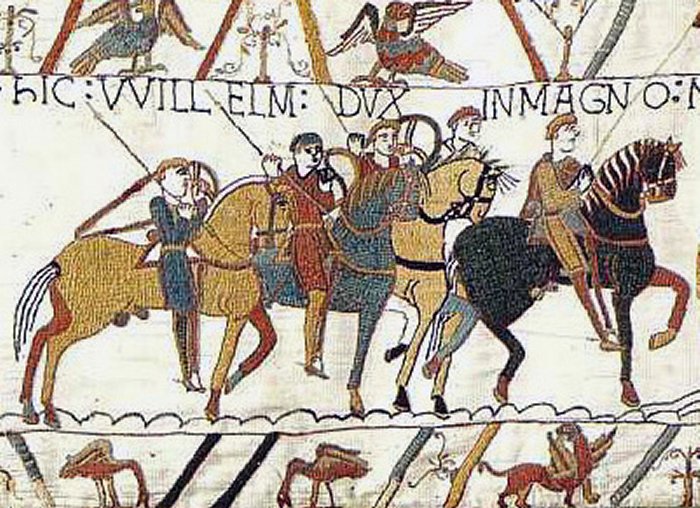William The Conqueror: Ruthless And Powerful Ruler Who Changed Britain Forever
A. Sutherland - AncientPages.com - Wilhelm I Conqueror, also known as "William the Bastard" (ca. 1028 -1087), was King of England and Duke of Normandy.
William the Conqueror & Harold II swearing - 11th century. Image: Adobe Stock - Erica Guilane-Nachez
William was the son of Herleva and Robert I, the Duke of Normandy, France, then known as “Francia”). William was frequently called a bastard, especially by his opponents. The reason was that his mother actually never married his father, Robert, most probably because Herleva was a simple Anglo-Saxon woman and not of noble birth.
Although he was the illegitimate son of the Duke of Normandy Robert the Magnificent (also called "Robert the Devil"), after his father's death in 1035, William was named his successor at only eight years of age. Under the name of William II (in French: Guillaume II), the boy became the new duke of Normandy during a challenging time.
William The Conqueror's Struggle To Gain Power
Corruption, violence, and strong opposition from powerful Norman barons, his bitter rivals, plagued his early reign.
Three of his guardians and his tutor died violent deaths during his childhood. William witnessed the end of his steward, Osbern, whose throat was cut by a Norman rebel while sleeping in William's bed-chamber.
William managed to survive the early years of chaos, both in his own life and in Normandy, with the help of King Henry I of France. From 1046 onwards, he successfully dealt with rebels, troublesome Norman barons, and all those who questioned the right of a bastard to succeed. Then with the support of Henry I, he began to expand his territory.
A late-1800s engraving shows William the Conqueror after the Battle of Hastings. Source
In 1051 the king of England, Edward the Confessor, appointed William as his successor. Edward died in 1066, leaving no direct heirs, and the country was threatened with invasion by two rival claimants, Harald Hardrada, King of Norway, and William, Duke of Normandy.
The English nobles elected to the throne their candidate - Harold Godwin (also called Harold Godwineson or Godwinson), the most powerful of the English lords.
William gathered his army and landed on the island. He was angry; Harold claimed the throne of England for himself, even though he made an oath to William to support his claim. On October 14, 1066, the two armies met in the famous Battle of Hastings.
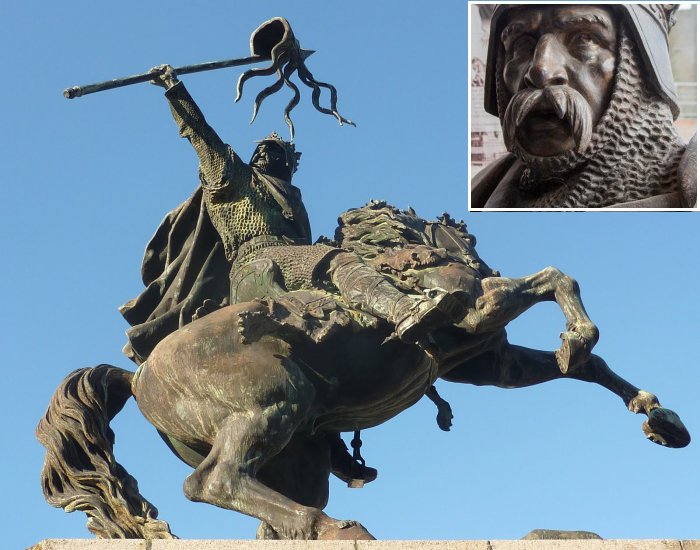 William, I was victorious and he took London without further resistance. Image credit: Man vyi - Public Domain
William, I was victorious and he took London without further resistance. Image credit: Man vyi - Public Domain
According to modern scholars' estimation, each of the sides had between 5,000 and 7,000 men.
William The Conqueror Becomes King Of England
King Harold and his two brothers were killed in the battle. William, I was victorious; he took London without further resistance. He was crowned king of England on Christmas Day, 1066, and ruled until he died in 1087.
However, the conquest of England had not yet ended. Several revolts marked the next five years, and William used them as an excuse to confiscate English land and declare it his property. Subsequently, he distributed the land to his Norman knights, who imposed their unique feudal system.
The following important issue was a nationwide inventory of property landlords and property of the people. William had to determine the taxes he had to pay all his subjects.
The Bayeux Tapestry, chronicling the English/Norman battle in 1066 which led to the Norman Conquest. Image credit: alipaiman - Public Domain
Once an entire picture of England was collated in the Domesday Book, William could send his tax gatherers out. Eventually, the Normans replaced the whole of the Anglo-Saxon aristocracy.
His famous "The Domesday Book" was a detailed register of the population and property of England (now an invaluable source of historical information and still in the Public Record Office in London).
William died on September 9, 1087, in Rouen, France. He had four sons and five daughters; every monarch of England since has been his direct descendant.
He never spoke English and was illiterate, but his influence on England and the English language was enormous.
"William the Conqueror was a fierce warrior that may cause gentler people to shudder. However, our world needs such people. Without them, we might destroy ourselves and our civilizations based on disorganization and a lack of cohesive leadership..." 1
Written by – A. Sutherland AncientPages.com Staff Writer
Updated on February 25, 2023
Copyright © AncientPages.com All rights reserved. This material may not be published, broadcast, rewritten or redistributed in whole or part without the express written permission of AncientPages.com
Expand for referencesReferences:
Ed Sharrow - The Last Battle: The Life of William the Conqueror
Edward Freeman - William the Conqueror
Abbott Jacob, William the Conqueror
- in60Learning, William the Conqueror: The King Who Changed the Course of British History
More From Ancient Pages
-
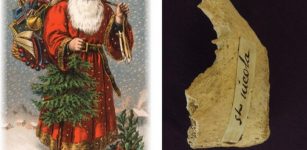 Examined Ancient Bone Suggests Santa Claus Was Real
Archaeology | Dec 8, 2017
Examined Ancient Bone Suggests Santa Claus Was Real
Archaeology | Dec 8, 2017 -
 Znojmo Catacombs – Huge Underground Labyrinth Under A Medieval City
Featured Stories | Jan 17, 2016
Znojmo Catacombs – Huge Underground Labyrinth Under A Medieval City
Featured Stories | Jan 17, 2016 -
 Cyrus The Great Cylinder – Legacy Of The Ancients
Artifacts | Aug 25, 2015
Cyrus The Great Cylinder – Legacy Of The Ancients
Artifacts | Aug 25, 2015 -
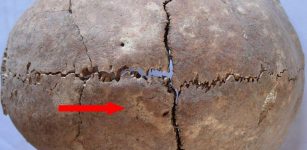 Physical Violence In Ancient Mesopotamia Much Less Common Than Ancient Texts Suggest – New Study
Archaeology | Mar 29, 2017
Physical Violence In Ancient Mesopotamia Much Less Common Than Ancient Texts Suggest – New Study
Archaeology | Mar 29, 2017 -
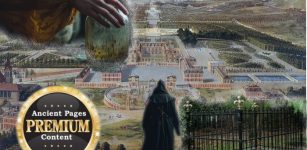 Mysterious Ancient Tomb And A Strange Vanishing In France – DNA Failed To Solve The Riddle?
Featured Stories | Feb 20, 2024
Mysterious Ancient Tomb And A Strange Vanishing In France – DNA Failed To Solve The Riddle?
Featured Stories | Feb 20, 2024 -
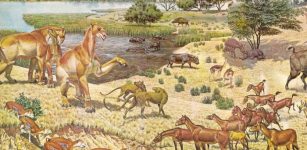 Horses In Florida Did Not Travel Far Distances – New Study Suggests
Archaeology | Jan 3, 2019
Horses In Florida Did Not Travel Far Distances – New Study Suggests
Archaeology | Jan 3, 2019 -
 Bizarre Meat-Eating Dinosaur Found In Classic Fossil Site In Egypt’s Sahara Desert
Archaeology | Jun 9, 2022
Bizarre Meat-Eating Dinosaur Found In Classic Fossil Site In Egypt’s Sahara Desert
Archaeology | Jun 9, 2022 -
 Dearg-Due Frightening Female Demon And Tyrannical Abhartach Of Irish Folklore
Celtic Mythology | Jan 5, 2017
Dearg-Due Frightening Female Demon And Tyrannical Abhartach Of Irish Folklore
Celtic Mythology | Jan 5, 2017 -
 DNA Study Reveals 250 Siberians Became The First Native American Population
Archaeology | May 12, 2018
DNA Study Reveals 250 Siberians Became The First Native American Population
Archaeology | May 12, 2018 -
 Magical Dinas Emrys: Legendary Battle Of The Dragons And Merlin’s Hidden Treasure
Featured Stories | Jan 15, 2025
Magical Dinas Emrys: Legendary Battle Of The Dragons And Merlin’s Hidden Treasure
Featured Stories | Jan 15, 2025 -
 Belobog White God In Everlasting Fight With His Cursed, Evil Counterpart, Chernobog In Slavic Beliefs
Featured Stories | Dec 4, 2017
Belobog White God In Everlasting Fight With His Cursed, Evil Counterpart, Chernobog In Slavic Beliefs
Featured Stories | Dec 4, 2017 -
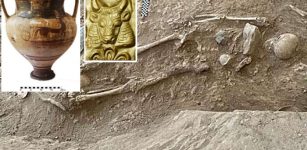 Tombs Rich In Artifacts Discovered By Swedish Expedition In Cyprus
Archaeology | Jul 6, 2023
Tombs Rich In Artifacts Discovered By Swedish Expedition In Cyprus
Archaeology | Jul 6, 2023 -
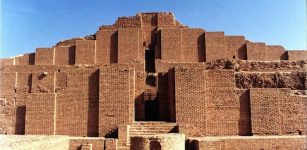 Chogha Zanbil: Huge Ancient Still Existing Ziggurat Dedicated To God Inshushinak
Featured Stories | Mar 10, 2016
Chogha Zanbil: Huge Ancient Still Existing Ziggurat Dedicated To God Inshushinak
Featured Stories | Mar 10, 2016 -
 Great Serpent Mound Of Ohio: Most Famous Ancient Earthwork Of North America
Civilizations | Mar 17, 2014
Great Serpent Mound Of Ohio: Most Famous Ancient Earthwork Of North America
Civilizations | Mar 17, 2014 -
 Mysterious Viking Gerdrup Grave – Burial Place Of Sorceress Katla And Her Son Odd Mentioned In The Eyrbyggja Saga?
Featured Stories | Mar 22, 2023
Mysterious Viking Gerdrup Grave – Burial Place Of Sorceress Katla And Her Son Odd Mentioned In The Eyrbyggja Saga?
Featured Stories | Mar 22, 2023 -
 Enigmatic Denisovans Interbred With Modern Humans More Than Once
Archaeology | Mar 22, 2018
Enigmatic Denisovans Interbred With Modern Humans More Than Once
Archaeology | Mar 22, 2018 -
 Mysterious Anomaly In Earth’s Magnetic Field Documented On 3,000-Year-Old Mesopotamian Bricks
Archaeology | Dec 18, 2023
Mysterious Anomaly In Earth’s Magnetic Field Documented On 3,000-Year-Old Mesopotamian Bricks
Archaeology | Dec 18, 2023 -
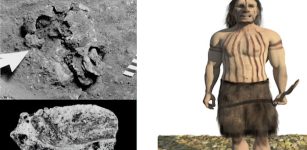 Re-Discovered Ancient Ksâr ‘Akil Fossils Shed New Light On Human Evolution
Archaeology | Mar 28, 2023
Re-Discovered Ancient Ksâr ‘Akil Fossils Shed New Light On Human Evolution
Archaeology | Mar 28, 2023 -
 New Clues To Behavior Of Neanderthal Hunting Parties
Archaeology | Mar 27, 2023
New Clues To Behavior Of Neanderthal Hunting Parties
Archaeology | Mar 27, 2023 -
 What The Egg Crisis Reveals About Our Food System
Archaeology | Apr 24, 2023
What The Egg Crisis Reveals About Our Food System
Archaeology | Apr 24, 2023

